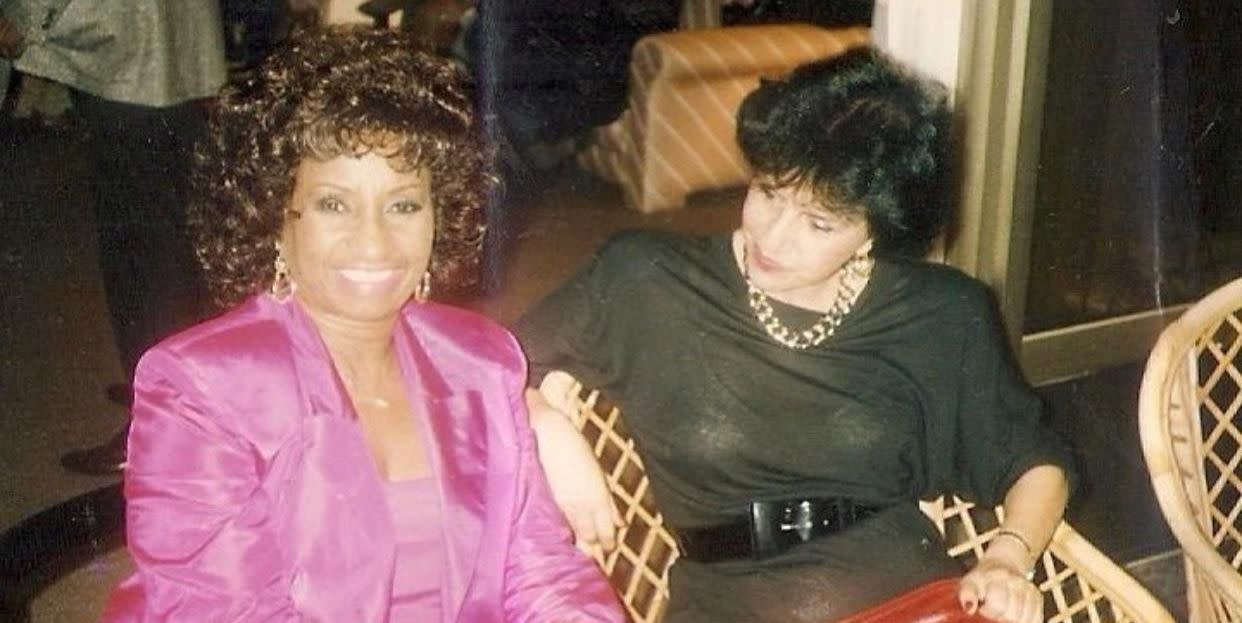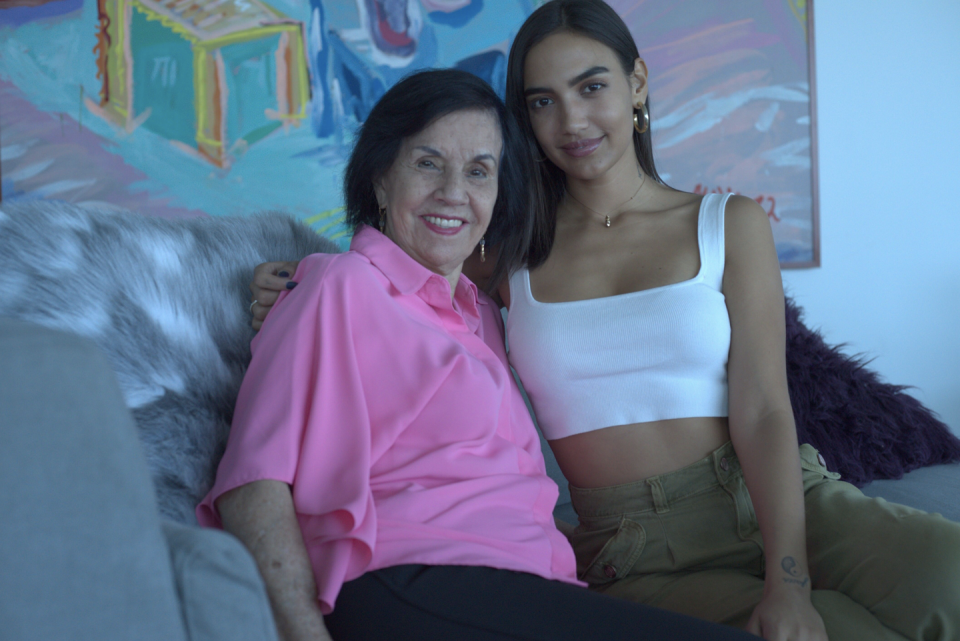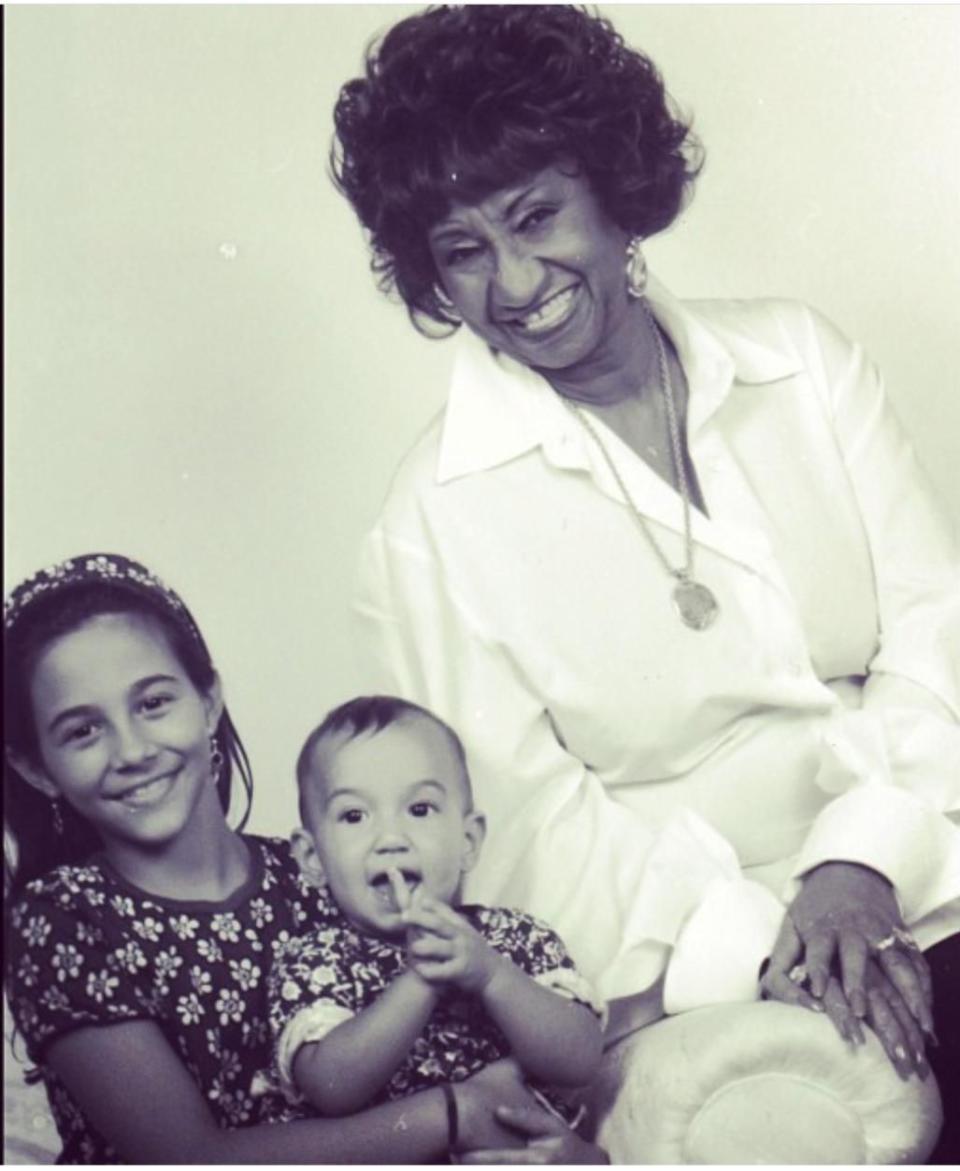My Grandmother Was One of Celia Cruz's Best Friends—Here’s What They Both Taught Me

Manu Manzo was just shy of two years old when she posed in a photo with one of her abuela’s best friends. But it wasn’t until she was nearly a teenager that she looked back at the portrait of herself as a doe-eyed toddler beside a joyful, smiling face, that she realized the woman next to her was Celia Cruz.
It turned out that when her grandmother, Mariahe Pabon, would tell her stories about her amiga “Celia,” she was talking about the Celia Cruz—the Havana, Cuba-born singer who helped bring salsa to mainstream music. After getting her start as the frontwoman of a band in Cuba, Cruz left the island in 1959 at the beginning of Fidel Castro’s rule. In the U.S., she began performing with fellow salsa singer Tito Puente and the Fania All-Stars—and quickly became a sensation, known as much for her signature throaty vocals as she was for her colorful wigs, wardrobe, and penchant for crying out "azucar!" Before her death in 2003 at the age of 77, Cruz would record 37 studio albums and earn the nickname “The Queen of Salsa” for providing the soundtrack for countless Latino households with classics like “La Vida Es Un Carnaval.” In 2016, the Recording Academy awarded Cruz a posthumous Lifetime Achievement Award at the Grammys.
Mariahe Pabon first met a 38-year-old Cruz in 1967 when she was 34, working in Venezuela as a driver and journalist. The two became fast friends, traveling the world together as Pabon got a front row seat to Cruz’s quickly-rising star. Though she was married for 41 years to fellow Cuban musician Pedro Knight, Cruz never had kids, but she loved Pabon’s children and grandchildren like her own—including Manzo, who was too young to remember meeting Cruz but grew up hearing her abuela’s tales of their adventures.

Now 25, Venezuelan-born Manzo is a singer and songwriter herself, named a Billboard “Latin Artist to Watch” in 2018. Manzo says that for her, even nearly two decades after Cruz's death, her legacy remains influential. “Celia Cruz songs like ‘La Negra Tiene Tumbao’ and ‘La Vida Es Un Carnaval’ are such staples for us Latinos. And Celia being not only a woman, but a woman of color, opened up the doors for so many female artists like me who have come after her,” says Manzo, who released a six-song EP earlier this month that soulfully blends tropical, reggaeton, and jazz genres.
To commemorate what would have been Cruz’s 94th birthday on October 21, Manzo sat down with her now 90-year-old grandmother—known to her as “Nonna”—at her home in Miami to learn more about the life, loves, and legacy of Celia Cruz.

*Note: This conversation between Manzo and Pabon has been translated from Spanish to English.
Let's start from the beginning. How did you meet Celia Cruz?
For many years, I worked as a reporter covering mostly pop culture for Radio Caracas Television in Venezuela. But I had just arrived in Venezuela from Colombia, and financially, I wasn’t doing too well. So a friend put me in touch with Guillermo Arenas, who at the time was one of the most successful businessmen in Latin America; he used to bring in a lot of popular musicians to perform in Venezuela. Guillermo offered me a job to pick up singers from the airport. And the very first person I went to pick up? Celia Cruz. I took her to her hotel and then to her office before she prepared to perform in some carnavals. From the first moment I met her, it was a friendship. I was a huge fan, but we also got along really well. After that trip, she started coming to Venezuela frequently for concerts, carnavals, and other events, and I would often drive her.
Many people know of Celia Cruz the artist. What was Celia really like in her personal life, offstage?
Celia was the absolute same person on and offstage. Except offstage, she would take off her wig. (Laughs) I once picked her up at her hotel and she opened her door without her wig. I was startled at first, and she laughed because she did that purposely to see my reaction.
But also, Celia was very “for the people.” She knew a lot of her fans couldn’t afford tickets to her shows, so almost every time she went to Venezuela, she did a free concert for her fans in the smaller towns, or “pueblos.” I remember once, she had just come back from playing at Olympia Hall in Paris, which she mentioned very nonchalantly. My husband commented that only the idols sing at the Olympia, and she said: “Yes, but it didn’t impress me. It’s a very small theater. I prefer singing where there’s thousands of people, because the people that really love me are the people from el pueblo, and that’s the public that I love and admire.”
What are some of your fondest memories of Celia?
I have a lot of amazing memories! I remember us being in Bogotá, Colombia together, and Celia and I would stay at the house of a close friend of mine who was like family. Celia would meet up with reporters there, and she would sing and cook—she was a great cook! We’d have so much fun. I remember we would also go to some carnavals in Barranquilla—we would go with her husband Pedro, who was her right hand man and one true love; he who would go everywhere with her.
I also remember one flight—at the time, a lot of aircrafts were getting hijacked to take to Cuba. And on one of our flights Celia joked: “Imagine if they kidnap this plane, they take it to Cuba, I get to see my family, and you write a story on it and win an award!” Of course, that didn’t happen. Celia's dream was to go back to Cuba, and that never happened.

We know she requested to be buried with soil from her beloved Cuba—did you guys ever talk about that, or about her missing home?
Yes, of course. She would speak with Fidel about going back and he would tell her yes, you can come—but you have to stay here. And that’s why she never went. She refused. She was 100 percent Cuban, and proud. All the big Cuban musicians in New York would always get together with her and they would play music together. I would join her in the studio in Caracas where she would record albums with Cuban musicians. She wasn’t really into politics, but she did fight for her country. The only thing she requested from the Cuban government was for her family to live in the apartment building she had bought there. Luckily, they allowed it. She would send them clothes, food, everything. She was, I guess, political in the way that she was constantly vocal about wanting Cuba to be free again.
How did you find out Celia Cruz had died?
Celia lived in New Jersey. She spent her last days in a beautiful apartment. She had a sister, a niece, and a nephew that lived in the U.S., and Celia was very close to them. But she got very sick. And when I found out, well, imagine. It was very hard.
But even though her physical body left, she left us a lot. The thing is, Celia was the embodiment of happiness, and love for the people. For example, she would gift all the new clothes she would wear for her shows to singers that were starting out, and a lot of clothes of hers were iconic pieces that she made famous—such as the “flying shoe.” [A signature shoe worn by Cruz that gave the illusion that it was floating.]
She was Cuban head to toe. Her love for Cuba was eternal. Her love for the people was incredible. Her husband Pedro told me that she always had little blank notecards on her because she would write notes to every single person she encountered. There are many people out there who probably still have a card from her.

My sister told me the other day she found a box of birthday cards that Celia would send her every year!
How beautiful. That photo that you guys have with her is such a gorgeous one. She never had kids. But she had nieces and nephews, and was friends with her loved ones kids. She had a huge love for them. The photographer that took that picture of you, Monica Trejo, took such an amazing photo of her that a Venezuelan millionaire bought—it’s the size of a wall! It’s the same exact picture you guys are in, but without you in it. (Laughs)
Amazing! I wish I remembered that moment more, but I love having that memento. To finish off our interview, as an artist, Celia has influenced me immensely. How do you perceive Celia’s influence now, versus what it was at the beginning of her career?
Well, she was a woman of the pueblo. The streets, so to speak, loved her, but she also received respect from the “higher” social class. She basically had anyone from anywhere enamored. She loved a good meal, and she loved white wine. Once, a friend of ours wanted to invite her out to have a delicious meal, so we went out in town in Caracas and she ordered her white wine—it was all very elegant. But when we entered the restaurant, everyone from the hotel—the servers, the cleaners—realized she was there, and she saw the ruckus that it was causing and she told them: “When I come out of the restaurant, I will come spend time with you. Said and done.” Once she was finished, she went outside and everyone was waiting for her. If a photographer would’ve been there, it would’ve been great. The whole cleaning crew of the hotel was there with their supplies and she went out there singing and talking to them.
Wherever she would go, she would be super welcoming and nice to everyone. She had charisma, she had a voice, and she was for the people. She wasn’t one of those artists that would sing and leave. She would receive everyone in her dressing room. Her love for music, and for musicians, was very pure, so I think she inspired young people a lot. They saw that she had talent, that she wasn’t a white woman but she still got to sing in all the countries of the world, at the most prestigious theaters.
She was her authentic, happy self. She was very popular and she still is. I recently went to the Celia Cruz museum here in Coral Way in Miami and honestly, I still to this day feel like she is simply an unforgettable character.
Manu Manzo is a Venezuelan born, Miami-raised singer-songwriter. Listen to her new EP Después de Las 12 on Apple Music or Spotify.
For more stories like this, sign up for our newsletter.

